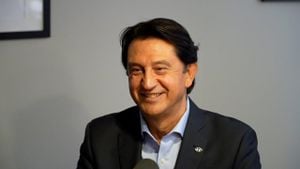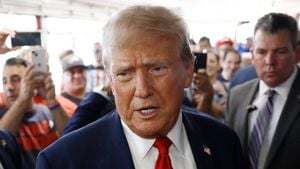Donald Trump's recent Cabinet appointments are stirring significant conversation as the president-elect assembles his administration for the upcoming term. Among the notable nominations, Trump has appointed Robert F. Kennedy Jr., known for his skepticism toward vaccines, as Secretary of Health and Human Services. Kennedy's controversial stance on health issues has already attracted criticism. Georges C. Benjamin, the executive director of the American Public Health Association, expressed vehement opposition to Kennedy's qualifications for the role, stating, "He is really just a person without a health background who's already caused great damage in health in the country." If confirmed by the Senate, Kennedy will oversee the administration of food safety, medical research, and various welfare programs.
Alongside Kennedy, Trump also named North Dakota Governor Doug Burgum as his choice for Secretary of the Interior. Burgum, who initially ran against Trump for the Republican nomination, may focus on managing national parks and overseeing lands owned by the U.S. government. This selection reflects Trump's strategy of incorporating his previous rivals, indicating he values loyalty and experience from within the Republican ranks.
Kennedy, whose family pedigree includes being the son of U.S. Attorney General Robert F. Kennedy and nephew of President John F. Kennedy, is recognized for his vocal opposition to childhood vaccinations. He previously claimed, "I do believe autism stems from vaccines." This assertion contradicts extensive research from health authorities, including the Centers for Disease Control and Prevention, which states there is no connection between vaccines and autism spectrum disorder.
Trump's educational policy plans, which build upon his past proposals, set out to dismantle the Department of Education, returning educational oversight to individual states. Trump's argument revolves around claims of overreach by the federal agency since its establishment in 1979, asserting it alienates state rights over education. The Department of Education plays a key role, managing approximately $238 billion of federal education funding, which supports various programs aimed at low-income and special needs students. Critics fear the potential dissolution of this funding structure might disproportionately harm disadvantaged communities, limiting access to quality educational resources.
The challenge of closing this department isn't just logistical; it requires substantial congressional support, including achieving a supermajority vote. Historical efforts to defund or abolish it, detailed under Trump's Agenda 47, have seen little success. Trump's allies propose redistributing education responsibilities across several federal departments, potentially resulting in significant restructuring of how education is managed nationwide.
Another layer to the conversation surrounds Musk’s involvement; he recently aligned himself with Trump’s education reform efforts, branding his support as part of restoring what he calls 'traditional educational values.' Musk's influence may reflect on the direction of educational reforms under Trump's leadership, aligning with conservative values aimed at counteracting what they term as progressive influence within schools.
Trump's approach to health also reflects on broader themes surrounding bureaucracy and government efficiency. Following his election, Trump indicated plans for appointing prominent figures like Elon Musk to lead new initiatives aimed at streamlining government processes, likely emphasizing privatization and reduced federal oversight.
Critically, the selection of Kennedy and Burgum, alongside Trump’s broader policy framework, reveals not only the ideological battles raging within the Republican Party but also offers insights on how Trump's administration aims to differ from previous Democratic-led initiatives. The incorporation of loyalty-driven nominations underscored by controversial figures hints at the confrontational approach Trump is likely to take against those who challenge his vision for America.
While Trump's supporters laud his decisive pick of figures with unwavering loyalty to his agenda, many observers remain cautious about the qualifications and ideological battles these appointees may face during confirmation. The Senate confirmation process will be pivotal not just for Kennedy and Burgum but for shaping the broader contours of Trump’s second term.
Overall, the discourse around Trump's cabinet formations suggests more than just personnel decisions; they reflect deep divides within American political and social landscapes, particularly as voters evaluate how these choices will affect educational, health, and broader policy discussions moving forward. The impending debates surrounding these nominations and the challenges they may face could significantly impact legislative priorities and public perception heading toward the elections.



